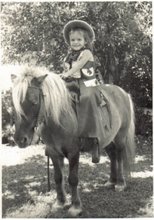None of my family and friends who tell me they read my blog ever leave me a comment, therefore, I am inordinately pleased when folks I've never even met take the time to write me a note to let me know they were here.
Ahem....
Many thanks, then, to Crunchy Chicken, who left me this message about the previous post discussing Speckle's potty training:
"Holy crap," said she, "That horse is a genius."
Well, I don't know about genius. I prefer to think of him as a guy who's had his consciousness raised. He is very open minded in all things which is very important in horses. And men. But that's another post.
Our dog, Trixie, was the first animal we clicker trained. By we, I mean mostly Logan and I, with Luke and Tim occasionally putting in their two cents' worth. In my mind, there was Trixie BC (before the clicker) and Trixie AC (you know...). She too had her consciousness raised. Literally - her consciousness raised, her mind opened. You could see her begin to process stuff, begin to figure things out. You could see her think.
(Here's a short video of Logan training Trixie. This is first video I've posted; it's taken me three days to figure out how to do. Sorry about the quality. I know Logan and Trixie look as if they're in the witness protection program. I'm working on it.)
You don't need a clicker to use the principles of clicker training. The clicker is helpful when training animals because it marks the moment the good thing happened. Example - I'm teaching my dog to sit. After ten minutes of pushing on her butt, she gets tired and sits. But by the time I've fished out a treat and given it to her, she is standing. So she doesn't know exactly what it was she did that earned the treat. With people you can just say, I really liked that you sat when I asked, so here's some chocolate. (You don't really need the chocolate either; the compliment is enough, although an occasional chocolate doesn't hurt.)
These principles are based on the science of behavior. Read that again, it's important. The science of behavior. Science, as in research with animals in laboratories; not folklore or guesswork which so much animal training through the centuries has been.
Here are the most important things to know about training any creature or changing any creature's behavior:
1. Reward good behavior and you will get more of it.
2. Ignore unwanted behavior and it will disappear.
(Dangerous behavior has to be stopped in its tracks; "punishment" only works when it stops the behavior; I say, act crazy when you stop the behavior so you leave a lasting impression on the trainee. You want to scare him, not hurt him.)
Here's another important thing: These things are already taking place in every relationship you are in. If you are getting bad behavior, then you are somehow rewarding it (usually by paying attention to it; any kind of attention is rewarding. There's nothing worse than throwing a fit and no-one noticing.)
An example: We were babysitting a friend's two-year-old son a couple of weeks ago. He began to get upset when he realized his mom was leaving, even though he had been rude to her while she was here talking to us. We shooed her out the door, assuring her he/we would be fine. The boy threw himself on the floor and began to cry angrily. Tim, Logan, and I kept up our conversation, sometimes having to talk rather loud to hear each other over his angry fit. After seven or eight minutes of not getting any attention from us, he got up and began playing with his toys. He showed us his toys and we played with him and it was very pleasant. We rewarded him with a lot of attention.
I worry that this sounds like a game. Realize that you are already playing this game in every relationship you are in - with children, parents, siblings, co-workers, pets, etc. I'm just giving you the rules so you can make them work for you instead of...you know, losing.
In our family, we all know the rules. We talk all the time about positive reinforcement and negative reinforcement. A while back, Logan wanted me to snuggle with him on a day when we were having a family reunion the next day. I was buzzing around the house trying to get everything ready; Logan was laying on the couch feeling sick. I hate to say no to snuggling. (I am so lucky he wants to snuggle.) So I said, "Logan, I can't snuggle now because every time I do I get negative reinforcement from you because you make me feel guilty when I have to quit snuggling." Right away, he said, "Okay, if you snuggle with me for 15 minutes I promise I won't make you feel guilty when you get up." Deal.
I have barely scratched the surface of all the good things to be learned from clicker training and the science of behavior. To learn more, read Don't Shoot the Dog by Karen Pryor. It's a great book with lots of examples of many different creatures being trained. Also, check out some good training articles on Karen Pryor's website.
Thanks again to Crunchy Chicken for her comment about Speckles. Thanks in advance to my wonderful family and friends who are getting ready to leave comments. You all are wonderful. Go have a chocolate, on me.
Subscribe to:
Post Comments (Atom)


1 comment:
Very interesting post! I've had good results using this kind of training. I can't remember where I saw the clicker before, but I've seen that method used.
Keep up the posts!
Post a Comment